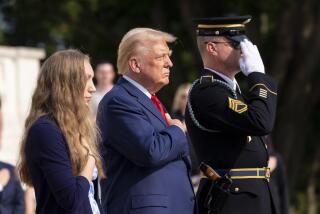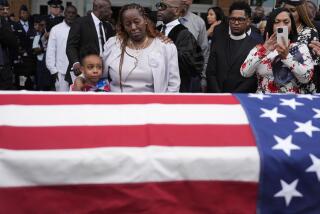Obama meets caskets of fallen troops
WASHINGTON — They said little to each other, the president and the grieving father.
The two faced each other in a large room in the chapel building, where other families quietly sat in small groups.
In the early morning darkness, when most of the country was asleep, 18 caskets were taken off a giant C-17 cargo plane.
One of them belonged to Steve Weston’s son, Michael, a Drug Enforcement Administration special agent killed in Afghanistan days earlier.
A military representative introduced each group in turn, and aides could see the president in quiet conversation as he clasped women by the hand or laid his hand on men’s shoulders.
“It was the saddest room I’ve ever been in; 18 grieving families from all walks of life,” Weston said. “It hurt so badly, and here he is, trying to offer comfort. And I respect him for that.”
On Thursday, President Obama flew nearly 100 miles by helicopter to Dover Air Force Base in Delaware to witness the return of the caskets -- the first time he has made the trip since becoming commander in chief nine months ago.
His visit came at a critical moment in the conflict in Afghanistan -- taking place during the deadliest month for U.S. troops since the war began in 2001.
The American general in charge of U.S. and allied forces there is calling for a big increase in troops -- possibly 40,000 or more.
Obama is taking his time making a decision, drawing sharp criticism that his lack of action is imperiling the U.S. mission. At the same time, the specter of a long war with many more deaths hangs over him.
On Thursday, he took a few hours to witness its ultimate cost.
President George W. Bush never went to Dover for the return of war dead. He conveyed his message by meeting elsewhere with the parents, spouses and children of the war dead -- events that were quiet and private, but frequent enough that word of them became a consistent part of the public story about Iraq.
Obama has also paid less-publicized visits to family members.
But the Dover moment was different, in part because the “dignified transfer” ceremonies had until recently been off limits to the media by Pentagon rule for almost two decades. Thousands of fallen troops have returned to their families via C-17 over the course of the last eight years.
Two days ago, the president had told an aide he wanted to be present to witness the transfer of those killed this week. Late Wednesday, White House officials began preparing for the travel and, shortly after midnight, Obama arrived on the base.
Michael Weston, 37, was one of three DEA agents killed in a helicopter crash Monday. He had been deployed with troops on a drug raid in northwestern Afghanistan. The agents were the first from the DEA to fall in the line of duty in the Central Asian country, underscoring the multifaceted nature of the drug-fueled insurgency.
The elder Weston, a lawyer from Lake Arrowhead, Calif., was accompanied by his first wife, Judy, and his son’s wife, Cindy. She married Michael in May, just weeks before he shipped off for Afghanistan.
The proud father wanted Obama to know that the younger Weston had something in common with the president.
“I said, ‘Mr. President, my son went to Harvard Law School just like you did,’ ” Weston said.
He described his son as a patriot who held off getting married because of his commitments, first as a Marine major doing several tours of duty in Iraq and other war zones, and then to the DEA.
After his last stint in Iraq in 2007, Weston retired from the Marines and worked the streets of Richmond, Va., as a drug agent, developing sources, conducting surveillance and building cases.
Given his Ivy League law degree and his military service, his son had been aggressively recruited by both the CIA and the FBI, but he picked the DEA instead, Steve Weston said.
“He thought he’d have more opportunity to go face to face with the bad guys,” the elder Weston said. And when the DEA began deploying dozens more agents to Afghanistan, Weston pestered his superiors until he received one of the slots.
Also killed Monday were Special Agents Forrest Leamon, 37, and Chad Michael, 30.
After meeting with the families, Obama watched as men in white gloves carried the caskets from a transport plane into mortuary vans.
Around 4 a.m., Obama’s helicopter took off for the return flight to the White House.
The first thing the president usually does on his night helicopter rides is flick on his overhead light, a sign for aides to lean in and talk business.
But as the Black Hawk blades whirred into motion, he left the light off.
“He just looked out the window or stared straight ahead,” said one person who sat near the president for the ride. “Nobody said anything.”
--
More to Read
Sign up for Essential California
The most important California stories and recommendations in your inbox every morning.
You may occasionally receive promotional content from the Los Angeles Times.











